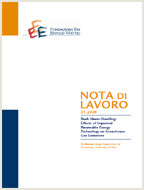Transition Towards a Green Economy in Europe: Innovation and Knowledge Integration in the Renewable Energy Sector

14.11.2016
Q55, Q58, Q42, O31, O33
Knowledge Spillovers, Renewable Energy Technologies, Fossil Energy Technologies, EU Innovation
Mitigation, Innovation and Transformation Pathways
Massimo Tavoni
A major concern regarding innovation in clean technologies in the EU is that the fragmentation of its innovation system may hinder knowledge flows and, consequently, spillovers across member countries. A low intensity of knowledge flows across EU states can negatively impact their technological base, suppressing opportunities for further innovations and hindering the movement towards the technological frontier. This paper evaluates the fragmentation of the EU innovation system in the field of renewable energy sources (RES) by examining the intensity and direction of knowledge spillovers over the years 1985-2010. We modify the original double exponential knowledge diffusion model to provide information on the degree of integration of EU countries’ innovation efforts and to assess how citation patterns changed over time. We show that EU RES inventors have increasingly built “on the shoulders of the other EU giants”, intensifying their citations to other member countries and decreasing those to domestic inventors. Furthermore, the EU strengthened its position as source of RES knowledge for the US. Finally, we show that this pattern is peculiar to RES, with other traditional (i.e. fossil-based) energy technologies behaving differently.
***
Suggested citation: Conti, C., M. L. Mancusi, F. Sanna-Randaccio, R. Sestini, E. Verdolini, (2016), ‘Transition Towards a Green Economy in Europe: Innovation and Knowledge Integration in the Renewable Energy Sector’, Nota di Lavoro 71.2016, Milan, Italy: Fondazione Eni Enrico Mattei
